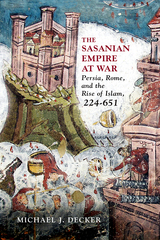
A comprehensive military history of one of the most important empires of Late Antiquity
The Sasanian Empire at War: Persia, Rome, and the Rise of Islam, 224–651 is the first comprehensive study in English examining war and society in one of the most important empires in world history: the Persian Empire of 224-651 AD, ruled by the Sasanian clan. At its height the Sasanians governed lands from the Indus River in the east to Egypt and the Mediterranean in the west. Adversaries of Rome, they also faced grave challenges from nomadic powers from Central Asia, notably the Huns and Turks. The Sasanians were able to maintain their empire for hundreds of years through nearly constant warfare, but when their expansion was checked in the north by the Byzantines at Constantinople in 626, and with the Muslim invasions to their south and west beginning in the 630s, the empire could no longer be sustained, and it finally collapsed.
In this book, Michael J. Decker examines Sasanian warfare, including military capabilities, major confrontations, organization and weapons of the Persian army. In addition to providing a comprehensive overview of the conflicts that marked this vital period in the history of Eurasia, The Sasanian Empire at War challenges long cherished notions of the inferiority of Sasanian military capabilities and renders a new image of a sophisticated, confident culture astride the heart of Eurasia at the end of the ancient world and birth of the Silk Road. Persian arms were among the many features of their culture that drew widespread admiration and was one of the keys to the survival of Iranian culture beyond the Arab Conquest and into the present day.

This work examines the travel account of a German baroque author who journeyed in search of silk from Northern Germany, through Muscovy, to the court of Shah Safi in Isfahan.
Adam Olearius introduced Persian literature, history, and arts to the German-speaking public; his frank appraisal of Persian customs foreshadows the enlightened spirit of the eighteenth century (influencing Montesquieu’s Persian Letters as well as Goethe’s West-Eastern Divan) and prepares the way for German Romanticism’s infatuation with Persian poetry.
Elio Brancaforte focuses on the visual and discursive nexus uniting Olearius’s text with the numerous engravings that supplement the book. The emphasis falls on contextualized readings of Olearius’s decorative frontispieces and his new and improved map of Persia and the Caspian Sea, as expressions of early modern subjectivity.

In The Expedition of Cyrus, the Western world's first eyewitness account of a military campaign, Xenophon told how, in 401 B.C., a band of unruly Greek mercenaries traveled east to fight for the Persian prince Cyrus the Younger in his attempt to wrest the throne of the mighty Persian empire from his brother.
With this first masterpiece of Western military history forming the backbone of his book, Robin Waterfield explores what remains unsaid and assumed in Xenophon's account—much about the gruesome nature of ancient battle and logistics, the lives of Greek and Persian soldiers, and questions of historical, political, and personal context, motivation, and conflicting agendas. The result is a rounded version of the story of Cyrus's ill-fated march and the Greeks' perilous retreat--a nuanced and dramatic perspective on a critical moment in history that may tell us as much about our present-day adventures in the Middle East, site of Cyrus's debacle and the last act of the Golden Age, as it does about the great powers of antiquity in a volatile period of transition.
Just as Xenophon brought the thrilling, appalling expedition to life, Waterfield evokes Xenophon himself as a man of his times—reflecting for all time invaluable truths about warfare, overweaning ambition, the pitfalls of power, and the march of history.
READERS
Browse our collection.
PUBLISHERS
See BiblioVault's publisher services.
STUDENT SERVICES
Files for college accessibility offices.
UChicago Accessibility Resources
home | accessibility | search | about | contact us
BiblioVault ® 2001 - 2024
The University of Chicago Press









